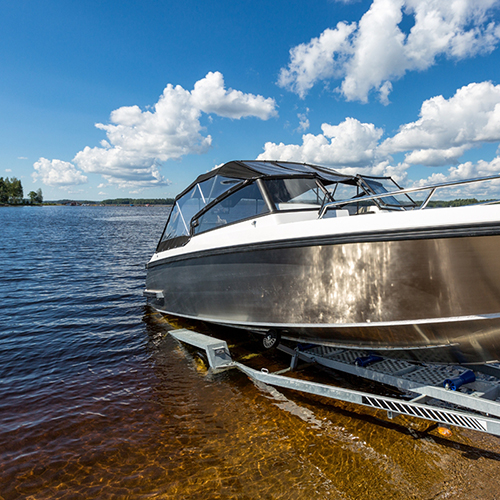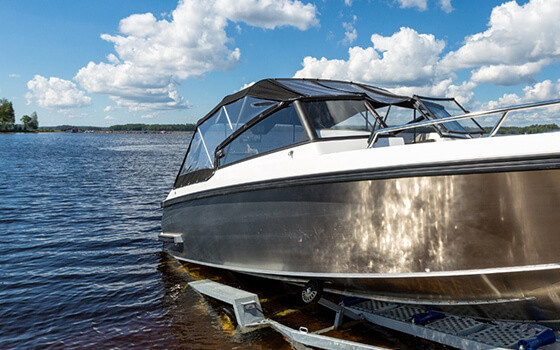Mastering Boat Trailer Handling: Essential Tips and Techniques
Properly towing a boat
Towing a boat can be a challenging task, especially for those who are new to it. The more experience you have, the easier it gets. Anyone with a little bit of knowledge and preparation, can safely tow a boat on a trailer. In this article, we will go over the basics of properly towing a boat and provide some tips to help make your boating experience stress-free and enjoyable.
Properly secured
Before towing, it is essential to make sure the boat is properly secured to the trailer. Double-check that all straps, ropes, and chains are tight and securely fastened to the boat and trailer. The boat should be centered on the trailer, with the bow and stern lines evenly tensioned. Additionally, make sure the boat's weight is properly distributed on the trailer to avoid overloading one side. Also, when using a drive-on trailer, make sure the boat is not tilted when you pull it from the water.
Check your lights
Another important aspect of towing a boat is to ensure that all lights on the trailer, including tail lights, brake lights, and turn signals, are functioning properly. Not only is this a requirement by law, but it is also important for safety reasons. Test all lights. Left turn, right turn, brake, rear and license plate are all required by law. Electrical wires should not be hanging loose or look frayed or worn. If you're unsure whether your lights are working, have someone follow you to check or use a portable tester.
Load weight and secure
It's essential to know the weight of your load before towing. This includes the weight of the boat, trailer, and any gear you're bringing with you. Knowing the weight of your load will help you determine whether your vehicle is capable of towing it safely. Secure your load appropriately. Use the proper anchor points for tie-downs and remember that a winch line is not a tie down. Make sure to consult your vehicle's owner's manual or speak with a professional to determine its towing capacity.
Sway control
One common problem when towing a boat is swaying. This can be caused by wind, uneven weight distribution, overloading your trailer, high speed driving, or driving on rough roads. To prevent swaying, consider using a sway control device. Sway control devices work by attaching to the trailer and vehicle and reducing the amount of movement between the two. This can help keep the boat and trailer stable while driving, making your trip safer and more enjoyable.
Properly inflate the boat trailer tires
Before each trip, make sure the boat trailer tires are properly inflated to the manufacturers recommended max psi, using a tire gauge. Tires that are underinflated can cause poor handling, excess tire temperature, and reduced fuel efficiency. Underinflation of your trailer tires can cause your tires to blow out while driving. Also, make sure to carry a spare tire in case of a flat and don't forget to properly inflate the spare tire if needed.
Evaluate wheel and fender conditions
Check wheels for cracks or deformities. Carefully inspect the boat trailer wheels and tires for any cracks, deformities, or other signs of damage. Cracks, dents, or other deformities in trailer wheels can indicate a structural weakness that could lead to failure. Additionally, check for any signs of corrosion or rust, which can weaken the wheel and make it more prone to failure.
- Tighten loose lug nuts to recommended torque specifications Trailer wheel bearings need to be greased at least every 10,000 miles or once a season for larger wheels.
- Check your fenders for cracks, bends, or sharp edges.
It's important to catch any issues with the wheels early on so they can be repaired or replaced before they cause any serious problems or put you and your passengers at risk.
What rims are best for my boat trailer?
If you’re taking your boat into salt-water you should be looking at galvanized or aluminum boat trailer wheels. Salt and water are corrosive and will eat away at a steel wheel quickly. Aluminum wheels often have more visual appeal and can even be more closely matched up to your tow vehicle. All wheels should be rinsed off after being in the water. In fact, it is best practice to rinse off your entire trailer after it’s been in the water. Make sure you’re also following the law when it comes to keeping your boat and trailer free from invasive species.

What tires are best for my boat trailer?
Type of driving
An important thing to consider when deciding on tires is what kind of driving you're going to be doing. If your trailer sits at your cabin and only takes the boat to its slip in the spring and to storage in the fall, then purchasing the more economical bias ply tires will meet your needs. This tire has a tougher sidewall and is a better tire for a trailer that sits most of the time.
If you are driving long distances or doing a decent amount of highway driving than the best choice for your trailer is a radial tire. Radial tires stay cooler and have a longer tread life due to its construction with steel belts.
Load rating
Load rating for boat trailer tires refers to the maximum weight that a tire can safely carry when inflated to its recommended pressure. This rating is typically displayed on the tire sidewall as a numerical code, known as the Load Index. The Load Index is usually a two or three-digit number that indicates the maximum load-carrying capacity of the tire.
For example, a tire with a Load Index of 84 can carry a maximum load of 1,102 pounds, while a tire with a load Index of 90 can carry a maximum load of 1,323 pounds. The higher the Load Index number, the greater the weight the tire can carry.
It's essential to ensure that the load rating of the tires on your boat trailer is adequate to handle the weight of your boat and trailer, including any gear and equipment you may be carrying. Overloading your trailer tires can cause them to overheat and wear out prematurely, leading to safety risks, such as tire blowouts, which can result in accidents.
Driving style
When towing a boat, it's important to adjust your driving style. Drive slower than you normally would and allow for extra braking distance. Avoid sudden stops and quick turns, and be mindful of other drivers on the road. Remember, a loaded trailer will have a longer braking distance, so allow yourself plenty of time to slow down and stop.
Check and inspect
Finally, inspect the boat, trailer, and all towing equipment before each trip. Check the straps, ropes, and chains to make sure they are in good working condition. Check the lights to make sure they are working and inspect the tires for proper inflation and any signs of wear or damage.
Recent Posts
-
Lawn and Garden Tire Information
Spring is here, which means it's time to bring out the lawn tractor and get the yard ready for warme …Mar 24th 2025 -
Snowmobile Trailer Tips
When the snow starts to fall, you may be itching to hop on your sled and hit the trails. However, be …Jan 6th 2025 -
Keep Your Golf Cart on Course - A Guide to Golf Cart Maintenance
Golf carts are a useful and convenient mode of transportation for leisure and for work …Sep 30th 2024




